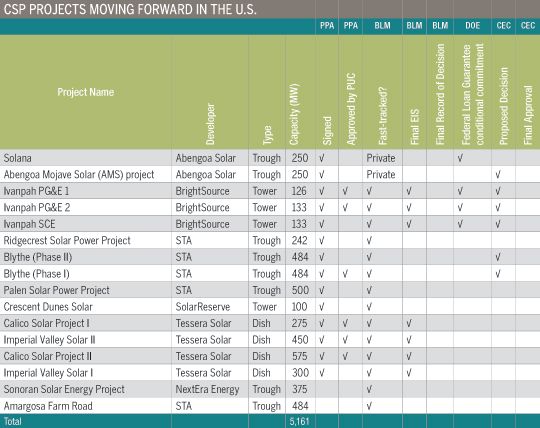In the U.S., over 30 concentrating solar power (CSP) projects with a combined capacity of 8.8 GW are on the drawing board and each has signed a power purchase agreement. But only one of them -- the Martin Next Generation project developed by NextEra in Florida -- is actually under construction. (Note that these numbers are just for solar thermal power plants. They exclude the handful of CPV projects discussed in a recent post.)
So, what's the hold-up?
There are several possible obstacles. As we discussed in an earlier post, the first and most obvious is financing. Raising billions of dollars in project debt and tax equity is no small feat -- especially if the returns offered to the equity investors aren't that great.
An equally significant obstacle is the maze of permitting and regulatory hoops that need to be jumped through before construction can begin. Both Tessera Solar and Mojave North America are planning CSP plants in Arizona to provide power that will go to California to escape the jurisdiction of agencies like California Fish and Game. Some developers have also shifted to concentrate on finding private land to build their power plants rather than BLM land because of some of the red tape involved.
-
Where Will DOE’s Loan Program Make the Next Climate Tech Investments?
48
-
What the Frack Is Happening With Natural Gas Prices?
15
-
With an Energy Crisis Brewing, No Peak in Sight for Emissions
9
Still, in the West, the BLM controls wide swaths of land that remain attractive to developers. To help alleviate this problem, the Bureau of Land Management has created a "fast-track" program to help speed things up.
There are 10 large CSP projects in the Southwestern U.S. that have been "fast-tracked" by the BLM. According to the BLM's website, 'fast-tracked' means that "these projects are advanced enough in the permitting process that they could potentially be cleared for approval by December 2010, thus making them eligible for economic stimulus funding under the American Recovery and Reinvestment Act of 2009." In layman's terms: we'll get right on these, so they can start construction in 2010 and receive the 30% Treasury Grant. If the BLM permits aren't ready by the end of 2010, and the Treasury Grant program isn't extended, then these projects will need to go with the 30% ITC tax credit -- and will need to find investors who need massive tax credits.
Three CSP projects have recently passed several of the permitting milestones. Looks like regulatory bodies are capable of making decisions, after all. Here are some of the details.
Brightsource's Ivanpah Project, 392 MW
8/4: California Energy Commission (CEC) siting committee issued a proposed decision recommending approval
8/6: Bureau of Land Management issues Final Environmental Impact Statement (FEIS)
Still outstanding: Final Record of Decision from the BLM
BrightSource expects to have all of the final permits necessary to commence construction in fall 2010.
Abengoa Mojave Solar (AMS) Project, 250 MW
8/6: CEC siting committee proposed decision recommending approval. The proposed decision is open for public comment for 30 days. The full commission is scheduled to make a final decision on September 8th.
If approved, Abengoa could start construction in 4Q 2010, with commercial service starting 1Q 2013
Solar Trust of America (STA) CA Solar 10 project in Blythe, 968 MW
8/11: CEC siting committee proposed decision recommending approval
If all three of these projects move forward, that would represent over 1.6 GW of new solar power plants in the U.S., effectively tripling the total CSP capacity.
Fingers crossed.
Below is a table summarizing the permitting status for the 10 "fast-tracked" CSP projects, and 2 advanced projects being developed on private land (Abengoa's Solana & Mojave Solar).
(Click on chart to enlarge)

